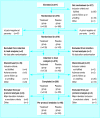Eradication of Helicobacter pylori in functional dyspepsia: randomised double blind placebo controlled trial with 12 months' follow up. The Optimal Regimen Cures Helicobacter Induced Dyspepsia (ORCHID) Study Group
- PMID: 10092259
- PMCID: PMC27795
- DOI: 10.1136/bmj.318.7187.833
Eradication of Helicobacter pylori in functional dyspepsia: randomised double blind placebo controlled trial with 12 months' follow up. The Optimal Regimen Cures Helicobacter Induced Dyspepsia (ORCHID) Study Group
Abstract
Objectives: To determine whether eradication of Helicobacter pylori relieves the symptoms of functional dyspepsia.
Design: Multicentre randomised double blind placebo controlled trial.
Subjects: 278 patients infected with H pylori who had functional dyspepsia.
Setting: Predominantly secondary care centres in Australia, New Zealand, and Europe.
Intervention: Patients randomised to receive omeprazole 20 mg twice daily, amoxicillin 1000 mg twice daily, and clarithromycin 500 mg twice daily or placebo for 7 days. Patients were followed up for 12 months.
Main outcome measures: Symptom status (assessed by diary cards) and presence of H pylori (assessed by gastric biopsies and 13C-urea breath testing using urea labelled with carbon-13).
Results: H pylori was eradicated in 113 patients (85%) in the treatment group and 6 patients (4%) in the placebo group. At 12 months follow up there was no significant difference between the proportion of patients treated successfully by intention to treat in the eradication arm (24%, 95% confidence interval 17% to 32%) and the proportion of patients treated successfully by intention to treat in the placebo group (22%, 15% to 30%). Changes in symptom scores and quality of life did not significantly differ between the treatment and placebo groups. When the groups were combined, there was a significant association between treatment success and chronic gastritis score at 12 months; 41/127 (32%) patients with no or mild gastritis were successfully treated compared with 21/123 (17%) patients with persistent gastritis (P=0. 008).
Conclusion: No convincing evidence was found that eradication of H pylori relieves the symptoms of functional dyspepsia 12 months after treatment.
Figures




Comment in
-
Eradication of Helicobacter pylori infection in non-ulcer dyspepsia. Commentary did not inform or update general medical community.BMJ. 2000 Jan 29;320(7230):311-2. BMJ. 2000. PMID: 10650037 Free PMC article. No abstract available.
-
Will eradication of Helicobacter pylori improve symptoms of non-ulcer dyspepsia? Meta-analysis included unreliable studies.BMJ. 2000 Apr 29;320(7243):1209; author reply 1210. BMJ. 2000. PMID: 10836828 No abstract available.
-
Will eradication of Helicobacter pylori improve symptoms of non-ulcer dyspepsia? More studies should have been included in meta-analysis.BMJ. 2000 Apr 29;320(7243):1209-10. BMJ. 2000. PMID: 10836829 No abstract available.
-
Treatment of Helicobacter pylori infection. Development of resistance to antibiotics used must be avoided.BMJ. 2000 Jun 3;320(7248):1540. BMJ. 2000. PMID: 10877582 Free PMC article. No abstract available.
References
-
- Talley NJ, Colin-Jones D, Koch KL, Koch M, Nyrén O, Stanghellini V. Functional dyspepsia. A classification with guidelines for diagnosis and management. Gastroenterol Int. 1991;4:145–160.
-
- Armstrong D. Helicobacter pylori infection and dyspepsia. Scand J Gastroenterol. 1996;31(suppl 215):38–47. - PubMed
-
- Bytzer P. Diagnosing dyspepsia—any controversies left? Gastroenterology. 1996;110:302–306. - PubMed
-
- Strauss RM, Wang TC, Kelsey PB, Campton CC, Ferraro MT, Perez-Perez G, et al. Association of Helicobacter pylori infection with dyspeptic symptoms in patients undergoing gastroduodenoscopy. Am J Med. 1990;89:464–469. - PubMed
Publication types
MeSH terms
Substances
LinkOut - more resources
Full Text Sources
Medical
